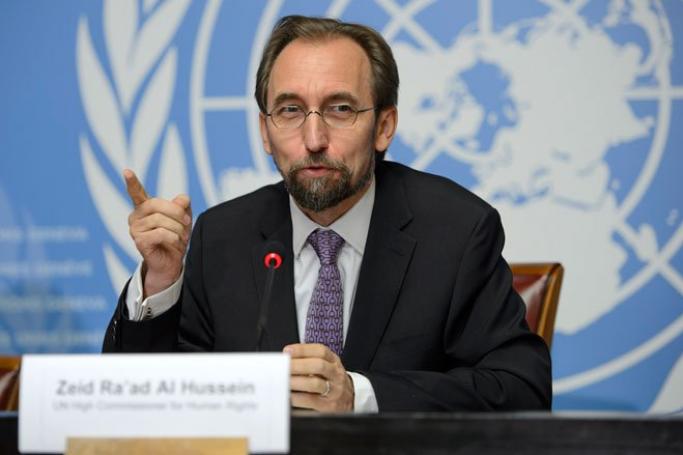UN High Commissioner for Human Rights Zeid Ra’ad Al Hussein has warned that Myanmar “seems headed in the wrong direction."
It needs urgently to get back on track in a crucial year for the country’s democratic transition and long-term reconciliation, according to a press release issued on February 25.
“The international community has seen the transition in Myanmar as a story of promise and hope,” the High Commissioner said. “But recent developments relating to the human rights of minorities, the freedom of expression and the right to peaceful protest are calling into question the direction of that reform, and even threatening to set it back.”
Mr Zeid cited a number of recent cases in which the new space for freedom of expression and peaceful protest has been curtailed by regressive application of the law.
“In the latest in a long line of similar cases, last week 14 members of the Michaungkan community were jailed for peacefully protesting the alleged confiscation of their land by the military. Last year, we saw the jailing of 10 journalists under outdated defamation, trespassing and national security laws. And U Htin Lin Oo remains in detention for speaking out against the use of Buddhism as a tool for extremism,” Mr Zeid said.
“Myanmar had promised to end the era of political prisoners, but now seems intent on creating a new generation by jailing people who seek to enjoy the democratic freedoms they have been promised,” he said.
The High Commissioner stressed that ensuring democratic space will be critically important for the upcoming constitutional referendum and elections. This will require greater tolerance and respect for freedom of expression and peaceful assembly
Mr Zeid expressed concern about the announced expiry of temporary identification cards.
“The decision appears designed to prevent ‘white card’ holders – the majority believed to be members of Myanmar’s stateless Rohingya Muslim minority – from being eligible to vote in the upcoming constitutional referendum and possibly in the General Election later this year. Furthermore, on 16 February, the Constitutional Tribunal ruled that it would be unconstitutional for ‘white card’ holders to vote in any upcoming referendum,” he said.
“During an election year, it will be tempting for some politicians to fan the flames of prejudice for electoral gain,” the High Commissioner said. “But at a time when religious extremism is creating havoc in many parts of the world, the terrible consequences of appealing to or appeasing such sentiments should be all too clear. A new democratic Myanmar should be built on the strength of its diversity.”
High Commissioner Zeid also expressed particular concern about four new laws, currently before Parliament, that are discriminatory against women and religious minorities and breach international standards on freedom of religion. The package of laws would place restrictions upon people who wish to change their religion, control the marriage of Buddhist women to non-Buddhist men, and allow the government to regulate birth spacing and family planning in certain areas through the designation of special zones for “healthcare”.
He said the situation in the Kokang self-administered zone in northeastern Shan State, which is fast deteriorating following the escalation of violence between the Myanmar Army, the Myanmar National Democratic Alliance Army and other armed groups, is also cause for alarm.
“It will be tragic for Myanmar’s peace process if this violence is allowed to spiral,” Mr Zeid said. “All parties must step back from the brink and ensure full respect for human rights and protection of the civilian population.”
Mr Zeid also called for accountability for any violations that may have been perpetrated by the military and by non-State armed groups.
On 13 February, Brang Shawng, an ethnic Kachin, was sentenced to six months in prison or alternatively a 50,000 kyat fine following his call to the Myanmar National Human Rights Commission for an investigation into the military’s role in the fatal shooting of his 14-year-old daughter. And in January, following the rape and murder of two Kachin school teachers working for the Kachin Baptist Convention in northern Shan State, the military warned that anyone alleging that the army was responsible for the killings would be subject to legal action.
“Ensuring accountability for the military will be a key test for the transition,” Mr Zeid said.
You are viewing the old site.
Please update your bookmark to https://eng.mizzima.com.
Mizzima Weekly Magazine Issue...
14 December 2023
New UK Burma sanctions welcome...
13 December 2023
Spring Revolution Daily News f...
13 December 2023
Spring Revolution Daily News f...
12 December 2023
Spring Revolution Daily News f...
11 December 2023
Spring Revolution Daily News f...
08 December 2023
Spring Revolution Daily News f...
07 December 2023
Diaspora journalists increasin...
07 December 2023
Euromoney Myanmar Global Investment Forum begins in Nay Pyi Taw












